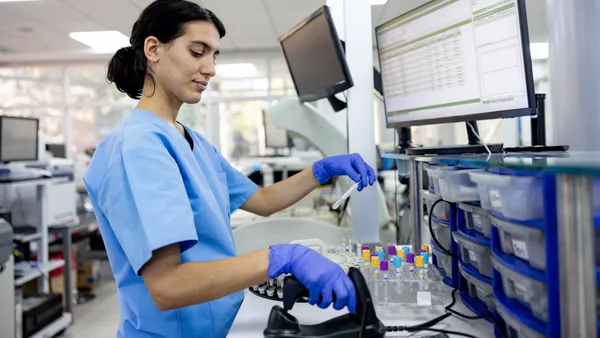Illumina continues to defend its $7.1 billion purchase of Grail, saying the acquisition would bring blood-based cancer detection tests known as liquid biopsies to market sooner.
The San Diego-based DNA-sequencing company faces separate challenges from regulators in the U.S. and Europe and may be forced by the European Commission to divest Grail.
The company on Tuesday defended the purchase in a public hearing before the Federal Trade Commission. Illumina won a previous challenge in September when an administrative law judge rejected the FTC’s concerns that the acquisition could stymie competition. However, the FTC appealed the case, leaving it to the five commissioners to decide whether to uphold or overturn the judge’s ruling.
The FTC’s argument focuses on concerns that Illumina could disrupt competition in the emerging market for blood-based cancer tests, as all current tests rely on Illumina’s equipment. FTC senior counsel Susan Musser said Illumina’s sequencers “are the only game in town.” By acquiring Grail, Musser said, Illumina is seeking to become a testing company, not just a provider of sequencing tools.
For its part, Illumina has argued that the acquisition would let Grail bring its cancer tests to market sooner. Accelerating the test by a year has the potential to save 10,000 lives in the U.S., said David Marriott, a partner with Cravath, Swaine & Moore representing Illumina. Marriott said it would not be in Illumina’s best interest to discriminate against rival cancer tests.
If the Commission decides to overturn the judge’s ruling, Illumina still could appeal.
“After dropping its case in federal district court, the FTC litigated and lost its challenge to the Illumina/GRAIL merger in front of its own administrative law judge,” Illumina spokesperson David Alpine wrote in an email. “The FTC attorneys now ask the FTC Commissioners to overturn the FTC’s own judge and prohibit this acquisition on speculative grounds rejected by its own administrative law judge. It’s time for the FTC to end this case and to start supporting the screening of cancer, assisting patients and lowering the cost of healthcare.”
“It is entirely possible that the FTC will overturn the [judge’s] ruling,” New York University Law School professor Eleanor Fox wrote in an email. “A huge question is whether more lives will be saved by allowing or prohibiting the acquisition,” wrote Fox, the Walter J. Derenberg Professor of Trade Regulation. “Is innovation likely to be better and swifter with more competition or more integration? This is a complicated fact question. A leaning of the antitrust law is to more competition, but of course this is always in factual context.”
Illumina is facing a more pressing challenge from the European Commission, which ruled to prohibit the already-closed merger in September. A divestiture order is expected early next year, J.P. Morgan analyst Julia Qin wrote in an email.
Once further details are available on the divestiture, including the timeline and funding, Illumina will need to communicate its plans for Grail, Qin said.
“I expect the EC mandates timeline to be on the shorter end (6-12 months), but in any case, implementation of the divestiture will take 9-18 months, bleeding well into 2024,” Qin wrote.










